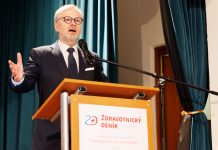Oncology is one of the priorities the Czech Republic is promoting in healthcare as part of their EU presidency. In the future, we could thus have the same standard of care throughout Europe, and those living in the EU could have more equal access to healthcare services both within their member states, as well as between them. Yesterday’s discussion of the ministers of health of the Czech Republic, Slovak Republic, Austria, Latvia, and Estonia at the 2nd Annual International Panel of the Zdravotnický deník Economics of Prevention Conference proved that oncology is a key issue not only for our own country. However, the good news is that the largest health insurance company in the Czech Republic, the Všeobecná zdravotní pojišťovna (General Health Insurance Company), counts on supporting the development of the treatments of oncological patients even in the future and hopes to also deal with the rapidly increasing costs associated with this treatment.
“The European Union does not have a unified healthcare policy, although it has one in other resorts. We now find ourselves in a historical moment given by the Covid pandemic and the joint purchase of vaccines. Discussions on whether some of the issues associated with the health of EU citizens should be coordinated and whether a common approach should be adopted are at hand. It seems that such discussions tend to come to an agreement, and oncology is a typical example of this,” the Minister of Health, Vlastimil Válek, said.

At the conference organised by the Ministry in July in Brno, the creation of a pan-European network of oncological centres was discussed, which should now also be discussed on the European level. The unification of protocols and standards should also take place, defining the minimum that should not be crossed. Another part of the oncological programme pertains to screenings, which should be standardised, as well as to programmes, such as the one targeted at colorectal cancer, where the quality should be defined.
“Without a doubt, there are tumours where the debate should take off from, be it the screening of lung carcinoma, the pilot project of which is now running in the Czech Republic, or prostate cancer, which is a huge issue. Here, we would like to become the country that suggests the screening protocol, and we will debate it,” Válek described.
The Aim is to Eradicate Unequal Access to Treatment
The ministers of health from the Slovak Republic, Estonia, and Latvia welcome the activities of the Czech Republic in the field of oncology. “Slovakia will support the regulation of onco-programmes, whether it be screenings or setting the standards that would be mutual and would represent the minimum that could not be crossed,” Vladimír Lengvarský said. “We fully support the priorities of the Czech presidency. When it comes to healthcare, the European Union could do much more. Of course, this includes treating cancer, which is one of the areas that each country of the EU must work on, so that they can do things better and in a more coordinated fashion. We can save numerous lives, and also, we must come up with how to spend our money in a more coordinated and wiser fashion,” the Latvian Minister of Health, Daniels Pavļuts, confirmed. “Some countries have policies that are quite successful, whereas in other countries, the situation is worse off. Therefore, learning from one another is something we direly need,” his colleague from Estonia, Peep Peterson, added.

Among others, fighting the unequal access of citizens to treatment is a huge issue. “The EU is primarily dealing with measures that reduce inequality between EU countries. The deciding factor is ensuring the equal access of citizens to all structures of care, as well as to innovations and progress regardless of age, gender, origin, and socio-economic background. This is also rooted as the strategic objective of the Austrian framework programme of beating cancer,” Johannes Rauch, the Minister of Social Affairs, Healthcare, and Consumer Care and Protection of Austria, said.
“There are differences between countries, within each country, as well as between individual socio-economic groups,” Daniels Pavļuts stated. “The death rate of various types of cancer in our country is higher in those with a lower education level and lower socio-economic status or other disadvantaged groups. In these communities, prevention and the screening rate is not at the desired level,” Vladimír Lengvarský pointed out.

How to counter these problems? “The macro-system reflects the micro-system. A lack of unified standards, insufficient coordination as part of various centres of excellence, no standards in cancer treatment that are applied in the same way, digitalization – all this reflects the same processes within each country. Therefore, we have a plan in Latvia that matches the priorities of the Czech presidency to a great extent, including strengthening the infrastructure of institutions, the accreditations of national centres for beating cancer, or the option of sharing best practices on a more regular basis. Digitalization can help us with all this, and the European Data Centre is a great thing,” Daniels Pavļuts thinks.

However, there are also other questions that we should address. “Aside from the Beating Cancer Plan, we will have a document that is soon to be published and pertains to the survival rate. However, some points have yet to be elaborated, such as the issue of workplace-related cancers, that is, the correlation of work conditions and origin of oncological diseases. This should be elaborated on the same level as in Finland, where the statistics are very well-treated,” Peep Peterson believes.
According to him, it is also necessary to focus on scientific research, especially in terms of genetics and treating early stages of the disease. Estonia can serve as an example in this sense, as it has elaborated genome mapping of one sixth of its population, and now it will scientifically analyse these data and develop them. Physicians then will have these findings at their disposal, and they should be able to use them in treating specific oncological patients in the next five to ten years.

The Austrian Minister of Health rather accents the importance of primary prevention. “Supporting health, health literacy, public relations, and the quality of life should be treated with the same importance as research and technological developments. The corresponding education of the population especially in the form of organized screening programmes and adjusting lifestyles, such as smoking or obesity, to lower the risk of cancer, is also necessary. Even though we must welcome all pivotal initiatives of Europe’s Beating Cancer Plan, it is noteworthy that the field of the primary prevention of cancer, for example supporting a healthy lifestyle, health factors throughout life, and reducing toxins in the environment, is not treated separately. In my opinion, it is desirable to focus on this issue to a greater degree,” Johannes Rauch emphasised.

Všeobecná zdravotní pojišťovna will support the Further Development of Treatments
What also helps implement these plans are health insurance companies. Therefore, the issue of prevention and the early detection of oncological diseases was discussed by the Všeobecná zdravotní pojišťovna (General Health Insurance Company) with both experts and the Ministry of Health already prior to the Czech presidency of the EU. It helps meet the first strategic objective determined by Europe’s Beating Cancer Plan in the form of prevention by, for example, setting aside resources for lung cancer screenings.
“We are ready to also meet the second strategic objective, that is, to provide our clients with an equal access to the best cancer treatments, the most expensive, and the most innovative treatment medicine and methods. We always professed that within the EU, the citizens of Czechia should have maximum access to new, extremely costly medicine,” the director of the Všeobecná zdravotní pojišťovna (General Health Insurance Company), Zdeněk Kabátek, said.

Even though payers must come to terms with the pressures of financing new, very costly medicine, the Všeobecná zdravotní pojišťovna (General Health Insurance Company) has been able to handle this task in recent years. Czech patients thus have personalised treatment available to them, including gene therapy, and new treatment methods and technologies are also financed. At the same time, the largest Czech health insurance company declares that it plans to continue in this trend despite Covid and the war in Ukraine. “This effort will continue even in the future, and we are ready to carry the costs associated with caring for our oncological patients. Všeobecná zdravotní pojišťovna (General Health Insurance Company) can continue to support the development of the treatment of cancer patients and to handle the rapidly increasing costs associated with it,” Kabátek promised.

The health insurance company attempts to also meet the third strategic objective, namely ensuring a quality system and increasing the quality of life of citizens and patients, by reflecting the standpoints of expert associations to the maximum possible degree.
“We are trying to find solutions that will make the system more effective. Not only will every one of our clients be informed on how to avoid oncological diseases, but they will also have the option of early detection and effective treatment. The issue that we are now discussing with oncological associations and with general practitioners is treatment that is quickly accessible in centres, and the quick transfer of clients through the system without unnecessary, repetitive tests, and then the effective return of them to regional facilities in the moment when their acute state is alleviated,” Kabátek added. In the case of late detection when treatment is no longer that effective, there is the attempt to improve the accessibility of palliative care.
„Although there is no unified healthcare policy of the EU and systems differ in terms of payments and the organisation of care, it is a great added value that in the field of fighting cancer, we have been able to come to an agreement and we have been able to set standards that should be similar throughout the European space and which should ensure that oncology should no longer be the threat that it has been for years,” Kabátek concluded.

The publishers of Zdravotnický deník are grateful for the support of the International Panel by the general partners of the conference, the Všeobecná zdravotní pojišťovna (General Health Insurance Company), the companies OR CZ, CCA Group, and MyCom, and the partners Zdravotní pojišťovna Ministerstva vnitra ČR (The Health Insurance Company of the Ministry of Health of the Czech Republic) and Vojenská zdravotní pojišťovna (Military Health Insurance Company).
Photo: Radek Čepelák
Michaela Koubová




